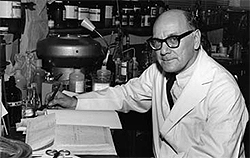

FULL STORY
Dr. Seifter: At the Heart of Einstein's Science and Compassion
Sam Seifter, a beloved member of the Einstein family since the College of Medicine's founding 54 years ago, passed away on Wednesday, February 25, in New Rochelle, NY, at the age of 92. Although in recent years his battle with Parkinson's disease had kept him from continuing his laboratory work and mentoring of students, his presence was still felt on campus through the countless individuals he had touched.

Dr. Sam SeifterDr. Seifter was internationally renowned for his work on collagen, the major protein in skin, tendons, bone, and cartilage that literally holds the body together. His research showing that collagen's protein chains are cross-linked into strong, rope-like units helped explain how collagen acts as a superb structural protein. He also showed that certain portions of the collagen molecule can stimulate the production of antibodies — work that contributed to the understanding of the autoimmune nature of rheumatoid arthritis.
Born in Cleveland, Ohio on December 1, 1916, Sam Seifter graduated from high school in 1933, during the depths of the Depression, and couldn't afford further education despite scholarship offers from Oberlin College, as well as several state universities in Ohio. He enjoyed recalling that Oberlin followed up with a supplemental football scholarship to make his attendance possible — an offer the diminutive Dr. Seifter declined.
He was out of school for nearly three years — half that time spent looking for a job and the second half working a 12-hour day at a clothing factory for eight dollars a week. That job allowed him finally to enroll as a chemistry major at Ohio State University, from which he graduated with honors in 1939. Dr. Seifter published his first paper while a junior at Ohio State and subsequently published more than 100 papers in chemistry and biochemistry, as well as numerous scientific reviews. In 1944, he earned masters and Ph.D. degrees from Western Reserve (now Case Western Reserve) University, where he began his academic career.
Elemental Medicine at Einsteinium
(Advice to Young Doctors on How to Treat Patients)
"A young doctor must be a good samarium
If patient's asleep don't dis-terbium
try always to helium
if possible curium
But never, no never, to barium."
A poem by Sam SeifterDr. Seifter became an assistant professor of biochemistry at Long Island College of Medicine (now the State University of New York Downstate College of Medicine) in 1945. He began his association with Einstein in 1955, and was appointed professor of biochemistry in 1961, the department that he later chaired from 1976 to 1987. After becoming professor emeritus in 1988, Dr. Seifter continued his research and teaching well into his 80s, and was highly regarded among generations of M.D. and Ph.D. students as an innovative and inspirational teacher.
Among his innovations, Dr. Seifter was instrumental in establishing the medical college's scientific journal, Einstein Quarterly (now the Einstein Journal of Biology and Medicine), for which he was faculty advisor and chairman of the editorial board. Some years earlier, in 1968, Dr. Seifter spearheaded creation of the King-Kennedy Scholarship Program, a first-of-its kind program in which promising minority students received an intensive year of tutoring at Einstein to make them academically qualified to apply for admission to the medical school. The program proved highly successful and was later emulated by several other medical schools.

Dr. Sam SeifterAs a champion of social justice, he also was among the first to challenge McCarthy era blacklisting of academics. His "unremitting efforts in the cause of social justice, particularly as it relates to medical education and scientific research" were officially honored in 1991, when an annual lecture on minority issues — the Sam Seifter Lecture — was established in his honor.
"In addition to his tenure as chair of biochemistry and introducing the course on medical aspects of biochemistry, Sam was a champion of the oppressed," notes Dr. Edward Burns, executive dean at Einstein, who studied under Dr. Seifter as a student at Einstein during the 1970s. "It was his inspiration that led to the establishment of the Einstein King-Kennedy Program for minorities, and his efforts sensitized this medical school to many social issues. He was truly a mentor to many."
Dr. Seifter's talent as a mentor to students and colleagues was widely celebrated, including a Life Teaching Award from Einstein and an annual teaching award in his name established by the alumni association of Downstate College of Medicine.
Dr. Seifter is survived by his wife, Eleanor, two children, Madeleine and Julian, four grandchildren, and a great-granddaughter.
Posted on: Friday, February 27, 2009


